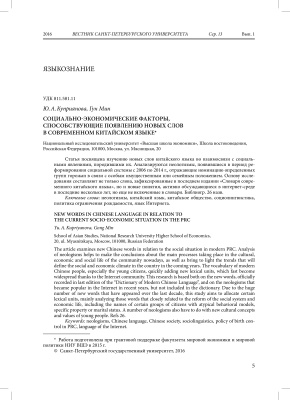Вестник СПбГУ. Сер. 13, 2016, вып. 1. — 14 с.
Статья посвящена изучению новых слов китайского языка во
взаимосвязи с социальными явлениями, породившими их. Анализируются
неологизмы, появившиеся в период реформирования социальной системы
с 2006 по 2014 г., отражающие номинацию определенных групп горожан
в связи с особым имущественным или семейным положением. Основу
исследования составляют не только слова, зафиксированные в
последнем издании «Словаря современного китайского языка», но и
новые понятия, активно обсуждающиеся в интернет-среде в последние
несколько лет, но еще не включенные в словари. Библиогр. 26 назв.
The article examines new Chinese words in relation to the social
situation in mode PRC. Analysis of neologisms helps to make the
conclusions about the main processes taking place in the cultural,
economic and social life of the community nowadays, as well as
bring to light the trends that will define the social and economic
climate in the country in the coming years. The vocabulary of
mode Chinese people, especially the young citizens, quickly
adding new lexical units, which fast become widespread thanks to
the Inteet community. This research is based both on the new
words, officially recorded in last edition of the “Dictionary of
Mode Chinese Language”, and on the neologisms that became popular
in the Inteet in recent years, but not included in the
dictionary. Due to the huge number of new words that have appeared
over the last decade, this study aims to allocate certain lexical
units, mainly analyzing those words that closely related to the
reform of the social system and economic life, including the names
of certain groups of citizens with atypical behavioral models,
specific property or marital status. A number of neologisms also
have to do with new cultural concepts and values of young people.
Refs 26.
Куприянова Ю.А. Социально-экономические факторы, способствующие появлению новых слов в современном китайском языке
Статья

- формат pdf
- размер 196,95 КБ
- добавлен 06 августа 2016 г.

